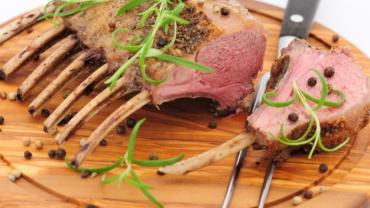
It’s always nice when off-the-charts amounts of nutrients come wrapped up in delicious, satisfying foods. And patients are more likely to stick to healthful diets when they know they can eat foods they genuinely enjoy. One food that health professionals can confidently recommend to patients is lamb.
Lamb is a staple food year-round in some regions of the world, but in North America, it’s more common in spring. Cultural practices and religious rituals dating back thousands of years used the traditional sacrifice of a lamb to honor religious laws and mark the beginning of the spring season. In the modern age, many families’ Easter dinners and Passover Seders wouldn’t be complete without a centerpiece of succulent lamb.
It’s interesting that, for many individuals, vegetables and fruit usually come to mind first upon hearing the phrase “vitamins and minerals.” The surprising truth is, the meat of ruminant animals contains an array of nutrients that rivals most produce. The nutrient profile of lamb is similar to that of grass-fed beef, which is known for its generous concentration of minerals and B vitamins. Besides being a fantastic source of complete protein, lamb provides impressive amounts of the B family, and is particularly high in niacin and B12. It’s also loaded with zinc, iron, copper, potassium, phosphorus, selenium, and even contains appreciable amounts of magnesium—a mineral more closely associated with leafy green vegetables. In light of all this, lamb might be the tastiest multivitamin around!
Most lamb available in North America is grass-fed and grass-finished. The raising of lamb for meat is still a relatively small industry, so unlike beef production, it does not rely on animal feed consisting mostly of subsidized grain. Many small farmers across the continent raise lamb on pasture year-round, so you can find it at a local farmers’ market or online. Imported lamb largely comes from Australia and New Zealand, where it is also primarily grass-fed and finished.
Of course, anyone who’s ever eaten a roasted leg of lamb, dripping with fat and juices, knows there’s more to lamb than just its meat. Mutton tallow—the rendered fat of an older sheep—contains mostly saturated and monounsaturated fats, with a smaller amount of polyunsaturated. A growing body of evidence suggests that, in the context of a lower-carbohydrate diet, dietary saturated fats have little undesirable effect on blood lipids. Moreover, despite the nearly automatic association of red meat with saturated fat, the predominant fatty acid in mutton tallow is actually not saturated, but monounsaturated. In fact, it’s oleic acid, the same one that is believed to be responsible for some of olive oil’s health-promoting properties.
Mutton fat is also a good source of the parent omega-3 fatty acid, alpha-linolenic acid (ALA). With about 4.7g ALA and 11.3g linoleic acid per cup, the omega-6 to omega-3 ratio ratio is approximately 2.4:1, making it an ideal part of any low-carb or Paleo-style diet. As if all that wasn’t enough to reduce the practice of draining every last bit of fat and sticking only to “lean meat” when it comes to lamb, lamb is also a good source of conjugated linolenic acid (CLA), but the amount depends on the animals’ feed and supplementation.
Lamb is delicious and nutritious all by itself, but the nutrient profile gets boosted even higher from some of the culinary preparations it’s commonly paired with. Herb rubs and marinades containing fresh lemon juice, rosemary, and mint are classic with lamb, as is yogurt sauce. Yogurt contains probiotics that support immune health and may also aid in digestion. Phytochemicals in rosemary have been shown to be anti-inflammatory and anti-carcinogenic, and the antioxidants in its primary polyphenols, rosmarinic acid and carnosic acid, are more potent free radical scavengers than vitamins C and E. Mint also contains powerful antioxidants, possible anti-carcinogens, and mint has been used for centuries to aid in digestion and calm an upset stomach.
So the next time a patient says that health food is boring, point them toward herb-marinated lamb. It’s one of the most delicious “diet foods” out there!